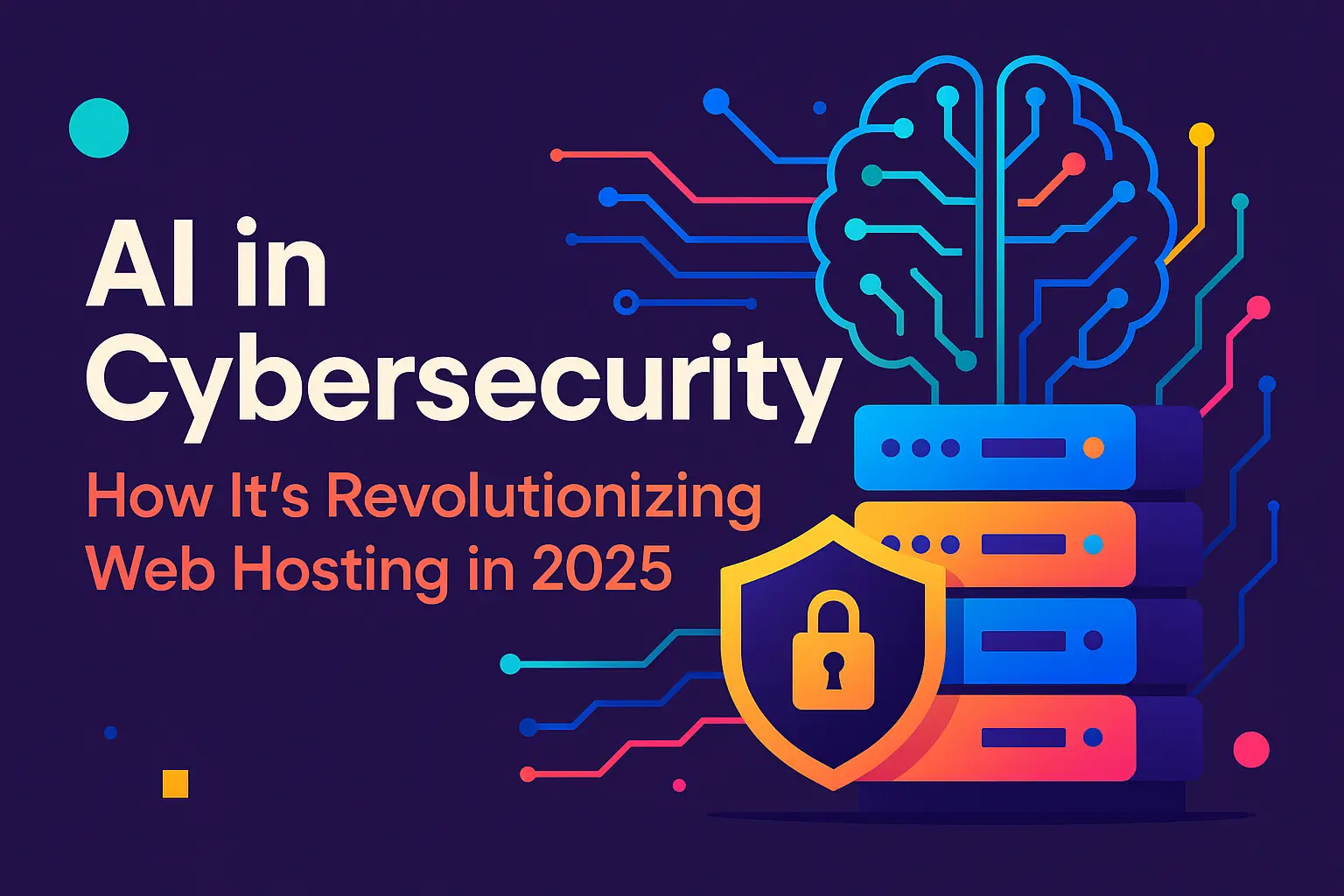Table of Contents
Introduction
AI in Cybersecurity is revolutionizing how web hosting platforms protect digital infrastructure in 2025. As the volume of cyberattacks grows and their complexity increases, businesses can no longer rely on outdated defense mechanisms. Traditional tools like firewalls and antivirus software struggle to keep up with zero-day threats, phishing attacks, and sophisticated malware.
This is where AI in cybersecurity shines—by leveraging real-time analytics, machine learning, and behavioral pattern detection to protect websites and hosting environments around the clock. Whether you’re running a shared server, VPS, or cloud infrastructure, AI in cybersecurity is becoming a must-have technology, not a luxury.
In this post, we’ll explore how AI is transforming the cybersecurity landscape for web hosting providers and customers alike, along with the key benefits, challenges, and future trends.
1. Why Cybersecurity Is Critical in Web Hosting
Web hosting providers are prime targets for cybercriminals. From small business websites to enterprise applications, hosting environments are rich with data and access points. Cyberattacks not only lead to data breaches but also reputation damage, downtime, and financial loss.
With thousands of websites often hosted on a single server, a single vulnerability can lead to mass compromise. That’s why AI in cybersecurity is fast becoming essential. Unlike traditional systems, AI can:
- Detect anomalies in real-time
- Predict threats based on historical data
- Continuously improve defense strategies through machine learning
2. The Limitations of Traditional Cybersecurity Tools
Before AI, hosting providers relied on a patchwork of security tools: firewalls, antivirus software, blacklists, and manual monitoring. While useful, these tools are:
- Reactive rather than proactive
- Dependent on signatures or known attack patterns
- Poor at detecting zero-day threats or polymorphic malware
Most importantly, they lack the ability to learn and adapt—which is what AI in cybersecurity brings to the table.
3. What Is AI in Cybersecurity?
AI in cybersecurity refers to the application of artificial intelligence technologies, such as machine learning (ML), natural language processing (NLP), and deep learning, to enhance digital protection.
In web hosting, this translates to:
- Real-time threat detection
- Automated incident response
- Predictive analytics to prevent attacks
- Bot detection and mitigation
- Behavioral analysis of server and user activity
4. Benefits of AI in Cybersecurity for Web Hosting
Let’s break down how AI in cybersecurity is redefining secure hosting:
a) Real-Time Threat Detection
AI models constantly monitor traffic, system behavior, and user activity. They detect anomalies far faster than human teams.
Example: A sudden spike in outbound traffic from a WordPress site can trigger AI to investigate possible malware activity before damage occurs.
b) Predictive Security
AI uses historical data to forecast future attacks. This helps hosting providers:
- Patch vulnerabilities early
- Harden firewalls
- Preempt phishing campaigns
c) Automated Incident Response
In traditional systems, human teams investigate alerts manually. AI in cybersecurity automates this process:
- Quarantines infected files
- Blocks malicious IPs
- Rolls back server states automatically
d) Improved Bot Management
AI distinguishes between human users and bots with high accuracy. It blocks:
- Credential stuffing bots
- Scraper bots
- Fake account registration bots
e) Adaptive Learning
AI evolves with time. As threats change, the AI system trains itself to detect new patterns without manual rule updates.
5. Use Cases of AI in Cybersecurity for Hosting Providers
✅ AI-Powered WAFs (Web Application Firewalls)
Modern WAFs use machine learning to block SQL injection, XSS, and other injection attacks in real time.
✅ Spam Filtering in Email Hosting
AI identifies spam patterns beyond keyword matching by analyzing sender behavior, link history, and reputation scoring.
✅ DDoS Mitigation
AI in cybersecurity helps web hosts filter out malicious traffic during Distributed Denial of Service (DDoS) attacks while keeping legit users unaffected.
✅ User Behavior Analytics
AI spots suspicious login attempts, location changes, and unusual download volumes—flagging potential account takeovers.
6. Challenges of Using AI in Cybersecurity
While promising, AI is not without its obstacles:
- False Positives: Overzealous AI can block legitimate traffic
- Training Data Requirements: AI models require large, quality datasets
- Complexity: Implementing and fine-tuning AI systems takes expertise
- Cost: AI-based tools can be expensive for small hosting providers
Despite these, the long-term benefits of AI in cybersecurity outweigh the drawbacks, especially in preventing critical attacks.
7. The Future of AI in Cybersecurity and Hosting
In 2025 and beyond, we can expect even deeper AI integration in hosting:
- AI + Blockchain: For tamper-proof audit logs
- AI-as-a-Service Security APIs: Integrated into hosting control panels
- Edge AI in CDN Networks: Localized protection closer to users
- Autonomous Threat Response: Fully AI-driven incident handling with minimal human intervention
Hosting providers that embrace these advancements will gain a competitive edge in the market.
8. How Businesses Can Leverage AI in Cybersecurity for Hosting
Whether you’re a startup or an enterprise, adopting AI-driven security for your hosting stack is critical. Here’s how:
- Choose hosts offering AI-powered firewalls and malware scanning
- Integrate AI-based plugins in your CMS (like WordPress or Magento)
- Use AI analytics tools to monitor visitor behavior and threats
- Regularly audit AI decisions to reduce false positives
💡 Tip: Partnering with a hosting provider that has a strong AI security framework reduces your internal cybersecurity burden significantly.
9. Case Studies: Real Results from AI-Powered Hosting Security
🔐 Example 1: WordPress Malware Protection
A managed WordPress host integrated AI malware scanning. The result? 70% reduction in client infections within 3 months.
📈 Example 2: Traffic Anomaly Detection
A VPS provider used AI to detect and block a botnet attacking user login pages, saving over 100 clients from credential theft.
🔍 Example 3: Predictive Patching
One enterprise cloud host used AI to identify vulnerable plugins in client installs before they were exploited, preventing over 40 data leaks.
10. AI in Cybersecurity vs. Traditional Hosting Security
| Feature | Traditional Security | AI in Cybersecurity |
|---|---|---|
| Threat Detection Speed | Manual / Delayed | Real-time / Instantaneous |
| Adaptability to New Threats | Low | High |
| Scalability | Manual effort needed | Auto-scalable |
| User Behavior Monitoring | Minimal | Dynamic & predictive |
| Cost Efficiency (long-term) | Medium | High |
11. Best Practices for Implementing AI in Hosting Security
- Audit Your Hosting Stack – Identify which parts (WAF, DNS, login systems) need AI upgrades
- Train Your Team – Ensure IT staff understands how AI works and what it detects
- Use Multi-Layered AI Systems – Don’t rely on one tool; combine AI firewall + malware scanner + AI analytics
- Monitor & Adjust – Track false positives, tweak settings, and optimize regularly
- Test Before Deployment – Run controlled simulations of attacks to test your AI defense mechanisms
12. Tools and Services That Use AI in Cybersecurity (External Link)
For deeper understanding, check out Cloudflare’s AI-powered Bot Management – a real-world example of AI defending large-scale websites from malicious bot traffic.
13. Related Topics (Internal Links)
- Web Hosting Trends 2025 – Fast, Secure & Smart Hosting Solutions
- What Is Managed Hosting & Why More Businesses Are Switching in 2025
Conclusion
The rise of AI in cybersecurity has fundamentally changed the way we think about web hosting security. From advanced malware detection to real-time response, AI tools offer unmatched protection in an increasingly hostile online world.
Businesses and hosting providers that fail to adapt will remain vulnerable, while those embracing AI will gain the upper hand in performance, trust, and uptime.
In 2025, one thing is clear: AI in cybersecurity isn’t just the future—it’s the present.



